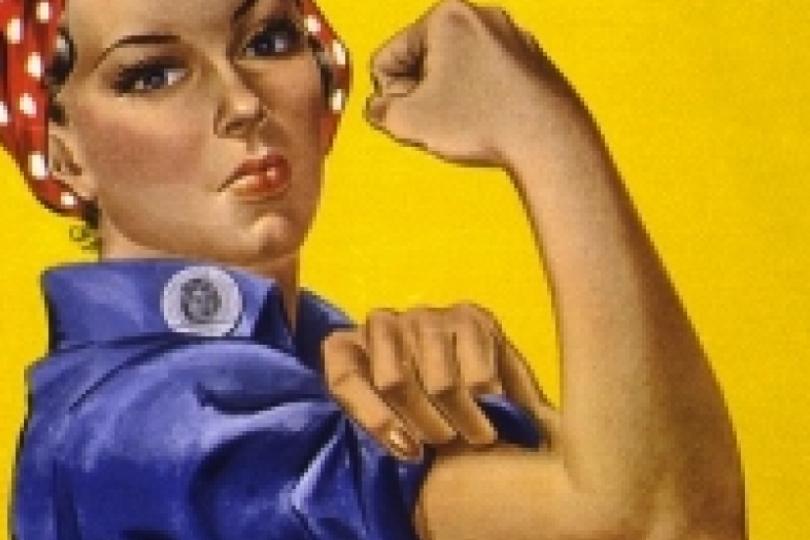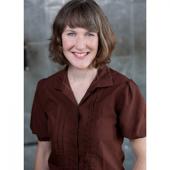A Very Short Bit on Women and Comedy
Editorial

Warning: This article has already been written. Not by me, per se, but by many other super smart and funny people, many of which I’ll mention below. (A recent and excellent example can be found here: Hey, Men, I’m Funnier Than You by Lindy West. Isn’t that good? Yeah, It really really is.)
***************
Hi soapbox. How are you? You’re never far. Anytime I’m feeling sassy (or there’s a happy hour), out you come.
Welcome to my soapbox. And here, upon this lovely crate, we get to delve into the opinionated and angry-making world of women and comedy.
But it’s really not that angry-making, as this conversation sort of got had about two years ago. The people who cared about the conversation said their piece, and the people who didn’t care just ignored it anyway.
I just felt that by commenting on that [are women funny?] in any real way, it would be tacit approval of it as a legitimate debate, which it isn’t. It would be the same as addressing the issues of “Should dogs and cat be able to care for our children? They’re in the house anyway.” I try not to make it a habit to seriously discuss nonsensical hot-button issues. - Mindy Kaling, ”Is Everyone Hanging Out Without Me? (And Other Concerns)”The question isn’t “are women funny?”, but rather, why aren’t women perceived as funny? Why is it, that when you say the word comedian, you might first think male? (Also doctor, president, soldier, millionaire...)
I'm not going to name names, but I know a local drummer who winces if you call him a local drummer. I imagine it's the same chilling dread I feel when I see the phrase "female writer." - Laura Buchholz, “Let’s Dial Down That Pride”, startribune.comOne reason is socialization. Guess what’s not funny? Socialization.
“I also found that men and women struggle when their opinions, feelings, and beliefs conflict with our culture’s gender expectations. For example, research on the attributes that we associate with “being feminine” tells us that some of the most important qualities for women are thin, nice, and modest. That means if women want to play it totally safe, we have to be willing to stay as small, quiet, and attractive as possible.” - Brené Brown, ”The Gifts of Imperfection”Or as the excellent Lindy West puts it, women are socialized to be “pleasant, pliable, and inoffensive”. Playing small and quiet can mean exactly that. Playing without confidence. Playing in worry. Playing in fear. And often, playing in deference to the male presence (often straight, often white) in the room. It’s generally an unconscious impulse. Just as Avenue Q taught us that we’re all just a little bit racist, we’re all just a little bit sexist too. If we’re aware that these stereotypes exist, why why why do we keep seeing them on stage? Because it’s easier. It’s less risky. Crazy girlfriend, nagging mother, prostitute, teacher. For whatever reasons, we know the ‘proper’ way to play these. We’ve seen these scenes many many times before, we know how they go, and often, the terrible part is the woman becomes no longer a full-blooded living-breathing character in the room, but a cypher, a stereotype, an object. Something to be used as a tool, and then discarded. And that kills me, even as I find myself putting myself into the same trap. (We also see these stereotypes in video games, film, comic books, television, the perception of certain members of the United States congress... But let’s keep the conversation to what we can almost immediately affect in our own community.) It’s risky and brave to play outside of the commonly used stereotypes. It’s risky and brave to take power in a situation. It’s risky and brave to stand in front of a crowd and tell a joke you wrote. It’s risky and brave to be “ugly.” ...Just as it’s risky and brave to be a “bitch”. (When I rule the world, everyone, before using the words ugly or bitch will have to take a 20 second time-out before saying those words. I will also have the ability to thump any theater or art writer who uses commentary on the looks of the performer as part of their art “criticism”. But I digress.) How can we break out of this incredibly limiting view? How can we, as a group, play without being limited? How can we make more funny? Let us, together, check ourselves before we wreck ourselves. Try something new. Best friend, adventurer, captain, lawyer, etc: we don’t know what these sound like. Both men and women performers - - be brave! Play characters with a different physicality than you, play characters with a different sexuality than you, play characters that you hate, play characters that you love - - and play them real. This practice can be most quickly realized in improv (which is often comedic), but can easily carry over to sketch, and certainly into stand up. Awesome? Awesome. We’re being fed gender ideals everyday (it’s as simple as looking at the magazine rack in a grocery store, or accidentally watching an episode of “Two and a Half Men”.) The practice is to recognize that, check your own perceptions, and see what change you can affect in yourself. That will affect what you put out into the world. And that’s good. And when I’m 70 and screaming ancient theater theories at community college freshmen (I’ll smell of Virginia Slims! I’ll be covered in scarves!), it might sound like this: Theatre (or storytelling or stand up or sketch or anything else one might do on a stage) is not about looking pretty! Comedy is not pretty! Take a risk! Theatre is about the ugly! About the grotesque! About vulnerability! About connection! Look, a caftan!
“Staying vulnerable is a risk we have to take if we want to experience connection.” - Brené Brown, The Gifts of ImperfectionLucille Ball stuffing chocolates into her mouth while on an assembly line might not be pretty, but it’s AMAZING. And then finally, just go do stuff. Put this into practice. As lovely Neil Gaiman just told a bunch of University of the Arts graduates, “Make good art. ...while you are at it, make your art. Do the stuff that only you can do.” You have a unique voice already - - go use it. See how brave you can be.
DON’T TELL ME WHAT TO DO! - Amy Poehler, all the timeIf you’re curious about this women and comedy stuff, keep reading: there’s a lot out there. From Macalester graduate Emily Schorr-Lesnick’s ”Funny Women” project, to Tina Fey’s defintion of “crazy” in show business, to Rachel Dratch’s explaining of ”The Unfuckables”.. And we haven’t even touched upon race or sexual identity yet. Let me know what you find - - I’d love to see your soapbox too.




